Media (English)
ARD-Interview with Assad – journalistic performance hits rock-bottom
10.03.2016
Subtitle "Afrikaans" was produced by machine.Subtitle "አማርኛ" was produced by machine.Subtitle "العربية " was produced by machine.Subtitle "Ārāmāyâ" was produced by machine.Subtitle "azərbaycan dili " was produced by machine.Subtitle "беларуская мова " was produced by machine.Подзаглавието "България" е създадено от машина.সাবটাইটেল "বাংলা " মেশিন দ্বারা তৈরি করা হয়েছিল।Subtitle "བོད་ཡིག" was produced by machine.Subtitle "босански" was produced by machine.Subtitle "català" was produced by machine.Subtitle "Cebuano" was produced by machine.Subtitle "ગુજરાતી" was produced by machine.Subtitle "corsu" was produced by machine.Podtitul "Čeština" byl vytvořen automaticky.Subtitle "Cymraeg" was produced by machine.Subtitle "Dansk" was produced by machine.Untertitel "Deutsch" wurde maschinell erzeugt.Subtitle "Untertitel" was produced by machine.Ο υπότιτλος "Ελληνικά" δημιουργήθηκε αυτόματα.Subtitle "English" was produced by machine.Subtitle "Esperanto" was produced by machine.El subtítulo "Español" se generó automáticamente.Subtitle "Eesti" was produced by machine.Subtitle "euskara" was produced by machine.Subtitle "فارسی" was produced by machine.Subtitle "Suomi" was produced by machine.Le sous-titrage "Français" a été généré automatiquement.Subtitle "Frysk" was produced by machine.Subtitle "Gaeilge" was produced by machine.Subtitle "Gàidhlig" was produced by machine.Subtitle "Galego" was produced by machine.Subtitle "Schwizerdütsch" was produced by machine.Subtitle "هَوُسَ" was produced by machine.Subtitle "Ōlelo Hawaiʻi" was produced by machine.Subtitle "עברית" was produced by machine.Subtitle "हिन्दी" was produced by machine.Subtitle "Mẹo" was produced by machine.Subtitle "Hrvatski" was produced by machine.Subtitle "Kreyòl ayisyen " was produced by machine.Subtitle "Magyar" was produced by machine.Subtitle "Հայերեն" was produced by machine.Subtitle "Bahasa Indonesia " was produced by machine.Subtitle "Asụsụ Igbo " was produced by machine.Textun"Íslenska" var framkvæmt vélrænt.Sottotitoli "Italiano" sono stati generati automaticamente.字幕は"日本語" 自動的に生成されました。Subtitle "Basa Jawa" was produced by machine.Subtitle "ქართული" was produced by machine.Subtitle "қазақ тілі " was produced by machine.Subtitle "ភាសាខ្មែរ" was produced by machine.Subtitle "ಕನ್ನಡ" was produced by machine.Subtitle "한국어" was produced by machine.Subtitle "कोंकणी語" was produced by machine.Subtitle "کوردی" was produced by machine.Subtitle "Кыргызча" was produced by machine.Subtitle " lingua latina" was produced by machine.Subtitle "Lëtzebuergesch" was produced by machine.Subtitle "Lingala" was produced by machine.Subtitle "ພາສາ" was produced by machine.Subtitle "Lietuvių" was produced by machine.Subtitle "Latviešu" was produced by machine.Subtitle "fiteny malagasy" was produced by machine.Subtitle "te reo Māori" was produced by machine.Subtitle "македонски јазик" was produced by machine.Subtitle "malayāḷaṁ" was produced by machine.Subtitle "Монгол хэл" was produced by machine.Subtitle "मराठी" was produced by machine.Subtitle "Bahasa Malaysia" was produced by machine.Subtitle "Malti" was produced by machine.Subtitle "မြန်မာစာ " was produced by machine.Subtitle "नेपाली" was produced by machine.Ondertitels "Nederlands" machinaal geproduceerd.Subtitle "Norsk" was produced by machine.Subtitle "chiCheŵa" was produced by machine.Subtitle "ਪੰਜਾਬੀ" was produced by machine.Podtytuł "Polska" został utworzony przez maszynę.Subtitle "پښتو" was produced by machine.Legenda "Português" foi gerada automaticamente.Subtitle "Română" was produced by machine.Subtitle "Язык жестов (Русский)" was produced by machine.Субтитры "Pусский" были созданы машиной.Subtitle "Kinyarwanda" was produced by machine.Subtitle "सिन्धी" was produced by machine.Subtitle "Deutschschweizer Gebärdensprache" was produced by machine.Subtitle "සිංහල" was produced by machine.Subtitle "Slovensky" was produced by machine.Subtitle "Slovenski" was produced by machine.Subtitle "gagana fa'a Samoa" was produced by machine.Subtitle "chiShona" was produced by machine.Subtitle "Soomaaliga" was produced by machine.Subtitle "Shqip" was produced by machine.Subtitle "србски" was produced by machine.Subtitle "Sesotho" was produced by machine.Subtitle "Basa Sunda" was produced by machine.Undertext "Svenska" är maskinell skapad.Subtitle "Kiswahili" was produced by machine.Subtitle "தமிழ்" was produced by machine.Subtitle "తెలుగు" was produced by machine.Subtitle "Тоҷикй" was produced by machine.Subtitle "ภาษาไทย" was produced by machine.ንኡስ ኣርእስቲ "ትግርኛ" ብማሽን እዩ ተፈሪዩ።Subtitle "Türkmençe" was produced by machine.Subtitle "Tagalog" ay nabuo sa pamamagitan ng makina.Subtitle "Türkçe" was produced by machine.Subtitle "татар теле" was produced by machine.Subtitle "Українська " was produced by machine.ذیلی عنوان "اردو" مشین کے ذریعہ تیار کیا گیا تھا۔Subtitle "Oʻzbek" was produced by machine.Phụ đề được tạo bởi máy.Subtitle "Serbšćina" was produced by machine.Subtitle "isiXhosa" was produced by machine.Subtitle "ייִדיש" was produced by machine.Subtitle "Yorùbá" was produced by machine.Subtitle "中文" was produced by machine.Subtitle "isiZulu" was produced by machine.
kla.TV accepts no liability for defective translation.kla.TV accepts no liability for defective translation.kla.TV accepts no liability for defective translation.kla.TV accepts no liability for defective translation.kla.TV accepts no liability for defective translation.kla.TV accepts no liability for defective translation.kla.TV не носи отговорност за некачествен превод.অপর্যাপ্ত অনুবাদের জন্য kla.TV কোন দায় বহন করে না।kla.TV accepts no liability for defective translation.kla.TV accepts no liability for defective translation.kla.TV accepts no liability for defective translation.kla.TV accepts no liability for defective translation.kla.TV accepts no liability for defective translation.kla.TV accepts no liability for defective translation.kla.TV nenese žádnou odpovědnost za chybné překlady.kla.TV accepts no liability for defective translation.kla.TV accepts no liability for defective translation.kla.TV übernimmt keine Haftung für mangelhafte Übersetzung.kla.TV accepts no liability for inadequate translationΗ kla.TV δεν φέρει καμία ευθύνη για ανεπαρκή μετάφραση.kla.TV accepts no liability for defective translation.kla.TV accepts no liability for defective translation.kla.TV no se hace responsable de traducciones incorrectas.kla.TV accepts no liability for defective translation.kla.TV accepts no liability for defective translation.kla.TV accepts no liability for defective translation.kla.TV accepts no liability for defective translation.kla.TV n'assume aucune responsabilité en cas de mauvaise traduction.kla.TV accepts no liability for defective translation.kla.TV accepts no liability for defective translation.kla.TV accepts no liability for defective translation.kla.TV accepts no liability for defective translation.kla.TV accepts no liability for defective translation.kla.TV accepts no liability for defective translation.kla.TV accepts no liability for defective translation.kla.TV accepts no liability for defective translation.kla.TV accepts no liability for defective translation.kla.TV accepts no liability for defective translation.kla.TV accepts no liability for defective translation.kla.TV accepts no liability for defective translation.kla.TV nem vállal felelősséget a hibás fordításértkla.TV accepts no liability for defective translation.kla.TV accepts no liability for defective translation.kla.TV accepts no liability for defective translation.kla.TV tekur enga ábyrgð á áræðanleika þýðingarinnarKla.TV non si assume alcuna responsabilità per traduzioni lacunose e/o errate.Kla.TV は、不適切な翻訳に対して一切の責任を負いません。kla.TV accepts no liability for defective translation.kla.TV accepts no liability for defective translation.kla.TV accepts no liability for defective translation.kla.TV accepts no liability for defective translation.kla.TV accepts no liability for defective translation.kla.TV accepts no liability for defective translation.kla.TV accepts no liability for defective translation.kla.TV accepts no liability for defective translation.kla.TV accepts no liability for defective translation.kla.TV accepts no liability for defective translation.kla.TV accepts no liability for defective translation.kla.TV accepts no liability for defective translation.kla.TV accepts no liability for defective translation.kla.TV accepts no liability for defective translation.kla.TV accepts no liability for defective translation.kla.TV accepts no liability for defective translation.kla.TV accepts no liability for defective translation.kla.TV accepts no liability for defective translation.kla.TV accepts no liability for defective translation.kla.TV accepts no liability for defective translation.kla.TV accepts no liability for defective translation.kla.TV accepts no liability for defective translation.kla.TV accepts no liability for defective translation.kla.TV accepts no liability for defective translation.kla.TV accepts no liability for defective translation.kla.TV aanvaardt geen aansprakelijkheid voor foutieve vertalingen.kla.TV accepts no liability for defective translation.kla.TV accepts no liability for defective translation.kla.TV accepts no liability for defective translation.kla.TV nie ponosi odpowiedzialności za wadliwe tłumaczenie.kla.TV accepts no liability for defective translation.kla.TV não se responsabiliza por traduções defeituosas.kla.TV accepts no liability for defective translation.kla.TV accepts no liability for defective translation.kla.TV не несет ответственности за некачественный перевод.kla.TV accepts no liability for defective translation.kla.TV accepts no liability for defective translation.kla.TV accepts no liability for defective translation.kla.TV accepts no liability for defective translation.kla.TV accepts no liability for defective translation.kla.TV accepts no liability for defective translation.kla.TV accepts no liability for defective translation.kla.TV accepts no liability for defective translation.kla.TV accepts no liability for defective translation.kla.TV nuk mban asnjë përgjegjësi për përkthime joadekuate.kla.TV accepts no liability for defective translation.kla.TV accepts no liability for defective translation.kla.TV accepts no liability for defective translation.Kla.TV tar inget ansvar för felaktiga översättningar.kla.TV accepts no liability for defective translation.kla.TV accepts no liability for defective translation.kla.TV accepts no liability for defective translation.kla.TV accepts no liability for defective translation.kla.TV accepts no liability for defective translation.kla.TV ንዝኾነ ጉድለት ትርጉም ዝኾነ ይኹን ሓላፍነት ኣይቅበልን እዩ።kla.TV accepts no liability for defective translation.kla. Walang pananagutan ang TV sa mga depektibong pagsasalin.kla.TV accepts no liability for defective translation.kla.TV accepts no liability for defective translation.kla.TV accepts no liability for defective translation.kla.TV عیب دار ترجمہ کے لیے کوئی ذمہ داری قبول نہیں کرتا ہے۔kla.TV accepts no liability for defective translation.Kla. TV không chịu trách nhiệm về bản dịch không đầy đủ.kla.TV accepts no liability for defective translation.kla.TV accepts no liability for defective translation.kla.TV accepts no liability for defective translation.kla.TV accepts no liability for defective translation.kla.TV accepts no liability for defective translation.kla.TV accepts no liability for defective translation.
This is a modal window.
The media could not be loaded, either because the server or network failed or because the format is not supported.
ARD-Interview with Assad – journalistic performance hits rock-bottom
10.03.2016
www.kla.tv/7865
On March 1st, the German television station ARD aired a 25 minute-long exclusive interview with Syrian President Bashar al Assad. ARD reporter Thomas Aders conducted the interview.
See the entire text of Assads interview - in the next tab: "Brodcast text"
[continue reading]
ARD-Interview with Assad – journalistic performance hits rock-bottom
Download broadcast and attachments in the wanted quality: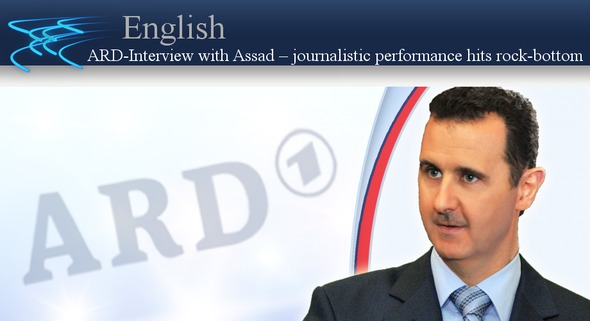
Useage rights:
Standard-Kla.TV-Licence
Trending on Kla.TV




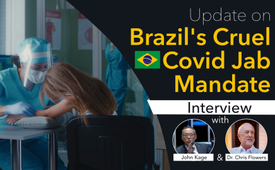
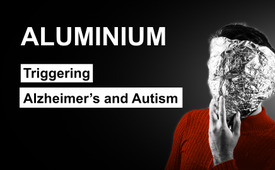
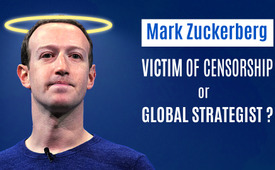

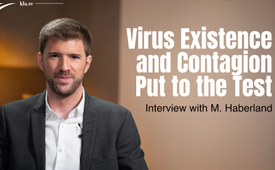


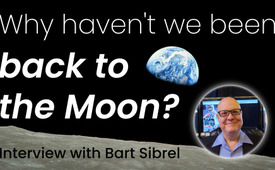
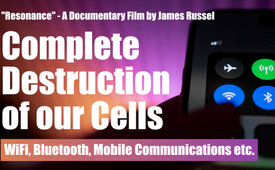
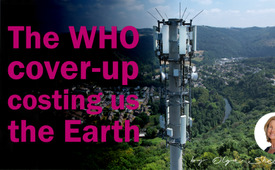
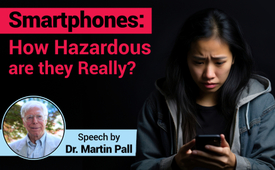
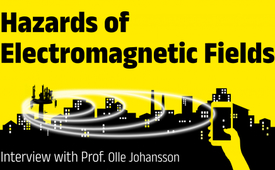
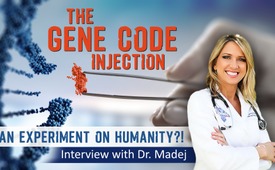




Sendungstext
herunterladen
10.03.2016 | www.kla.tv/7865
On March 1st, the German television station ARD aired a 25 minute-long exclusive interview with Syrian President Bashar al Assad. ARD reporter Thomas Aders conducted the interview. In this broadcast, editor in chief, Kai Gniffke referred to journalism’s the “core job”: To speak with Assad does not mean to approve of his politics or tolerate it. It is about wanting to know something from him, to question his view on things and to show sort of person he is. ARD is neither the International Criminal Court nor Interpol… Sounds good. Yet how precisely does ARD carry out this “core job” of journalism which, according to their own statement, they claim to carry out perfectly ? In fact they did it grossly, imprecisely as the following example shows: In a short video presented by the “Tagesschau” from March 1, an ARD-presenter asks the reporter Thomas Aders, I quote: “What drives Assad, what drives this man to wage war for years now?” Here is Aders’ literal answer: “He wants his system to survive, the system of his regime.” And he will do everything for it to carry on. He will fight any terrorist, he said that very clearly.” At this point, let’s have a first clarification: At no point in the interview did Assad say that he wanted “the system of his regime” to survive. He clearly said that he will bow to his people’s will, I quote Assad: “When the Syrian people want me to leave this position l have to do that... without any hesitation, because if you want to succeed as an official, as president, or as an elected prime minister, whatever, you need the support of the public. Without that support you cannot achieve anything.” Now concerning a second, even more embarrassing miss-interpretation of Aders. Aders continued, I quote: “And still Assad acknowledged – which I thought was very interesting – that Syria’s sovereignty wasn’t complete anymore due to help from Russia, Iran and the Lebanese Hezbollah through the arms supplies coming from them.” This statement was adopted by the German Press-Agency “dpa” and repeated; appearing with almost identical wording in “Zeit online”, “Kurier.at”, “Swissinfo.ch” and “Blick.ch”, I quote: “He admitted that Syria wasn’t “completely sovereign” anymore and receives military help from Russia, Iran and Lebanon.” However this conclusion by Aders’ cannot be understood from Assad’s answer in any way. Only from the question that Aders raised himself. This was: “Mr. President, can you still say that Syria is a sovereign state or is your policy already being made in Teheran and the Kremlin?” This is how Assad really answered: “Sovereignty is a proportional term. Before the crisis, Israel was occupying our country, so we didn’t consider our sovereignty to be complete, before having our land back. And now during this crisis many terrorists crossing our border and many American and alliance - what they call alliances - airplanes breaching our airspace. So you cannot speak of complete sovereignty here either. [...]“ So Syria’s sovereignty is not restricted due to Russia’s military help as Aders insinuated, but it’s because of the terrorists and because the USA and their allies violate their airspace! Even editor-in-chief Kai Gniffke interpreted Assad’s statements in his own way and immediately labeled him unquestionably as the one who used toxic gas, who starves people to death and so on. And this, although ARD called itself: no “Criminal Court”. Added to this even the United Nations and US-experts meanwhile strongly doubt that Assad used toxic gas. Assad himself commented on the accusation that he supposedly bombard Syrian hospitals as follows. I quote: “What would be the benefit for us if we do this? Of what interest could it be to us? [...] and the government...If you want to bring the people to your side, you need to offer them basic infrastructure and services. [...]“ So Kai Gniffke’s “core job of journalism” of which he praised himself of doing so commendably, just turned out to be not done after all. Instead of reporting in a neutral and objective way, the judgments about Assad were already made, his policy is demonized, his statements are ignored or misinterpreted. It is no wonder that the public broadcasters are continuing to lose their viewer’s favor when they continue to not do the “core job” of journalism and instead claim they do it. You can find the full interview with Syrian president Bashar al Assad attached right below this broadcast. It is informative in order to form an own opinion on the Syrian conflict. 29 questions in 25 minutes. ARD met Syrian President Al-Assad for an Interview in Damascus. Topics were the cease-fire, conditiond for his resignation as president, amnesty for rebels and his understanding of power. Following is the full text of the interview, as published by the official News Agency SANA: Journalist: Mr. President, thank you so much for granting us this interview on behalf of ARD German television. President Assad: You’re most welcome in Syria. Question 1: Yesterday, we were filming at the Omayyad Mosque, and we had some interviews with the people on the ceasefire. There was one guy selling shawarma, and he said “maybe this is a historical day.” So, my question, Mr. President is: would you agree that this was a historical day, and are we at a special time of Syrian history? President Assad: Let’s say I hope, rather than agree; because we agreed on the cessation of hostility, as we announced last week… let’s say it’s a glimmer of hope now, for the Syrians, for all of us. But usually, when you have a ceasefire or cessation of hostilities or any such agreement, which is bilateral, it’s going to be difficult to keep and save, let alone when it’s multilateral. When you talk about multilaterals, and when I say multilaterals you’re talking about more than one hundred factions of terrorists and so many other countries that support them. Or let’s say you talk about two camps with contradicting goals regarding the cessation of hostilities or that agreement. So, let’s say we hope, and we are going to do our job to make it work, but it’s not enough to have the good will. Question 2: What are you doing, you and the Syrian government, to make it stable, the ceasefire? President Assad: Actually, it started less than 48 hours ago; as you’ve been here for the last few days, I think you know that the terrorists breached the agreement from the very first hour. As for the Syrian Army, we have refrained ourselves from retaliating in order to give the chance for the agreement to survive. That’s what we can do, but at the end everything has a limit. It depends on the other side. Question 3: Why did it take so long to get an agreement? President Assad: It didn’t take so long to get to an agreement; it took so long for the other countries, who supervise the terrorists, to work for it, mainly the Americans. They started talking about it only a few months ago. For us, from the very beginning, we started this process on a local basis, something we called local reconciliation where you have this cessation of hostility, where you give the militants amnesty or offer them amnesty, in order to either join the Syrian Army or to go back to their normal civilian life. So, we started this process before, for the last years, and it succeeded in many areas. But this one is different, as we already talked about it, more comprehensive. It’s not fully comprehensive, but more comprehensive agreement. Question 4: Three days ago, we were in Daraya, we saw heavy bombardment on the other side, and I think this is one of the problems of Syria, that who is the one to decide if you’re fighting terrorists like ISIS or al-Nusra or is it rebels? I think the only one who can define is you. So, I guess the peace is in your hands, isn’t it? President Assad: What do you mean, peace in my hands? Question 5: Your decision is to strike or not to strike, and you define who are they. President Assad: You are right. When you have such agreement, you have to ask yourself about two things: what are the maps, the military maps, let’s say, that you’re going to work upon, and what are the criteria or let’s say the mechanism, of monitoring that ceasefire. Till that moment, it’s been as I’ve said more than 24 hours since we started the cessation of operations. So far, we don’t have maps. So, let’s say that the agreement is not mature yet. When it’s mature, you can take responsibility as one of the responsible sides on the survival of this agreement. Question 6: Imagine, Mr. President, I would be a rebel, not a terrorist of ISIS or al-Nusra, but a rebel, Free Syrian Army, what should I do that you will accept as a Syrian civilian again? President Assad: Just to give up your armament, whether you want to join the political process or not interested about the political process, you don’t have any political agenda, it doesn’t matter. The most important thing for me, legally and constitutionally, and basing on the interest of the Syrian people and the principle of any state that you’re not allowed, as a citizen, to hold machine guns and hurt people or properties. This is the only thing that we ask. We don’t ask for anything. As I said, we give them full amnesty, and that happened, and they joined the Syrian Army, and some of them joined political life. Question 7: So there is real amnesty you’re offering to all the rebels? President Assad: And it worked. We did it, and it worked. Question 8: Why the Syrian government cannot accept that there are two kinds of groups: one is the terrorist side, ISIS and al-Nusra, and on the other side the rebels, let’s say, more civilian. Why is always that you say we are just fighting terrorists? President Assad: Whoever holds armaments against civilians or against private or public property, legally is a terrorist. I think the same in my country and the same in your country. You don’t accept something called rebels in your country. You don’t accept something called “moderate opposition,” while you have opposition, to hold the armaments in order to reach its goal. So, it’s not accepted in any country. So, this is one aspect of your question. The other aspect: we don’t say every militant is extremist; we say the majority now, who took control of the field, let’s say, are only those extremist groups. The other party, that’s been promoted as moderate, is irrelevant, is trivial, it doesn’t have any influence on the ground, that’s why most of its grassroots have to join the extremists; not because they’re extremists, either out of fear, or for the money or for the salary. So, that’s when we say that what we are fighting the extremists, because the real, let’s say, enemy now, which is terrorism, is made of those terrorist groups, mainly Daesh, and al-Nusra, and Ahrar al-Cham, and Jaish al-Islam. Question 9: Don’t you feel that there is in fact still a difference? These terrorists, they are from abroad, they are coming from Saudi Arabia, from Chechenia, wherever in the world, while the rebels are at least Syrian, and at any point of the discussion, you have to talk to them, why you cannot start today? President Assad: We did. We already did it, and that’s what I talked about, that’s what I mentioned as reconciliations. With reconciliation, you have to talk to the militants, you don’t talk to a political opposition, you talk to the people who are fighting on the ground. That’s what we did, and I agree with that point. But when you talk about two different kinds of what you called them rebels, Syrians and other, actually they work together. You don’t have a group of foreigners in Syria; you have foreigners mixing with the Syrians in the same groups, and they share the same ideology, the same hopes of having what they call “Islamic State” or something similar, the same ideology that doesn’t accept any other one that doesn’t look like them. Question 10: Mr. President, you accepted a transitional process. What are the next steps? President Assad: Actually, the process is to have a national unity government, where whoever wants to come join our government, to be a part of it; this government should prepare for the next constitution. After the constitution, you should have parliamentary elections that are going to define the shape of the next Syria, or the new Syria. So, these are the main steps of the transitional period. Question 11: I was here in 2012 when the first elections were held, parliamentary elections four years ago. How can you say it’s possible to hold elections during the civil war? President Assad: First of all, there’s no civil war, because the definition is wrong. Civil war is when you have certain lines, social lines, based let’s say, on sects or ethnicities or any similar lines, so we don’t have those lines now, because in the areas controlled by the government, there is a mix, let’s say you can find in it every color of the Syrian social spectrum. So, you cannot talk about civil war as a definition. Actually, it’s the terrorists versus the rest. Second, for the elections, it’s not a hobby, first of all. It’s not the point of view of the president or the mood of the government. It doesn’t reflect all of that; it reflects the constitution. Our war is about independence of our country, because they want to depose the government and the president, other countries, mainly the West and Saudi Arabia and Qatar. It’s about destroying the state, and it’s about making Syria a sectarian country like Lebanon, and maybe like Iraq. The constitution today is the symbol of unity, the symbol of sovereignty, and the symbol of an independent country. We have to be adherent to the constitution. The constitution is not what’s written on the paper; it’s how you practice it. One of them is the elections, and this is not the right of the government; this is the right of every Syrian citizen. They have to decide whether they want it or not. If you ask any Syrian, everybody wants to have a new parliament. Question 12: Is the constitution, is stability in Syria more important than hundreds of thousands of lives? President Assad: There’s no contradiction, to put them which is more important, because if you don’t have stability you will have thousands of lives gone. If you have stability, you will save lives, so you cannot say one is more important than the other. Stability and constitutions are very important to save lives. Question 13: The overwhelming majority of countries, organizations of the world, say that there might be no solution for the Syrian question with you in power. Are you willing to step back? President Assad: For those countries and those officials? No, of course not, because it’s not their business. That’s why I never responded. It’s been five years since they said that, and we never give a damn to what they say. It’s only our business, it’s Syria’s business. Only the Syrian citizens have the right to say who they want to be the president. As a German, you don’t accept me or any other one to tell you who is going to be your chancellor, and what sort of political system. You don’t accept it, and we don’t accept it. So, no, regardless of whatever they say, my political fate is only linked to the will of the Syrian people. Question 14: But in general, if the conditions are that the Syrian people want you to step back, would you be willing? President Assad: Of course, definitely. When the Syrian people want me to leave that position, I have to do it right away, without any hesitation, because if you want to succeed as an official, as president, or as elected prime minister, whatever, you need the support of the public. Without that support you cannot achieve anything, so what would you do in your position. So, they are linked together; their will with your ability to achieve something or to succeed. Question 15: Is there any imagination already about the time of this step? There are a lot of, you know, dates mentioned. One is from the surrounding of de Mistura’s office. They say the most probable time would be 2018. President Assad: No, no. It’s not their business. It’s not part of any plan. As I said, this is only Syrian. We can only discuss it as Syrians. Question 16: Would you agree that what we see in Syria is a humanitarian disaster? President Assad: Of course, definitely. Question 17: Why then it took so long that you granted full access to the besieged areas in Syria? President Assad: Actually, no, that’s not true. We didn’t take a long time to give that access. Actually, the Western media took a long time to recognize what’s going on, on the ground. I’m being very frank with you. Let’s ask a very logical and realistic question at the same time: what they called “besieged areas” have been surrounded by the army for years now, and those areas are still fighting the army and shelling mortars on the army and on neighboring cities and so on. The question: how could we prevent them from having food while we cannot prevent them from having armaments? Is it logical? It doesn’t work. We either make a full embargo, or you cannot make an embargo. So, we don’t make embargo for many reasons, not only for the humanitarian aspects and for the values that we believe in and for our role as a government to be responsible for every Syrian, but actually, because if you do that you will send those civilians into the lap of the terrorists. The other practical example, how could we make an embargo on such cities that you mentioned and maybe other cities that’s been mentioned recently, and at the same time we are still sending salaries to al-Raqqa which is under the control of ISIS, and we’re still sending vaccines. How can we make an embargo here and not make an embargo there? This is a contradiction, it’s not realistic what you’ve mentioned. Question 18: Could you now after the ceasefire guarantee that there’s a permanent access for relief organizations for these besieged areas, like, continuously? President Assad: They’ve been working here for the last few years now. We never said no, but their work should be through the government, they cannot work as if there’s no government. So, we never said no, and of course you always have, let’s say, the reality on the ground, that maybe put obstacles where you have fighting, sometimes you have conflicts between the officials in the government and in those organizations, but as a political decision, we don’t have any problem with those, let’s say, aid, to reach anywhere in Syria, and we support that. Question 19: You’re mentioning the elections in Syria, coming on in April maybe. Wouldn’t you just deal with a fraction of the Syrian people, because so many left, and they left because they wanted to avoid the chaos in Syria. President Assad: Yeah, but for people to leave the country doesn’t mean the country doesn’t have its own population. I mean, in the end, Syria is not empty, and the majority of the Syrians still live in Syria, not vice versa, and that was the narrative before the presidential elections, and most of the world was surprised that those refugees participated in very high percentage in the elections outside Syria. So, I think every Syrian would like to see something new within his country, because this change will give hope to the people, and that’s natural in every culture, in every country. Question 20: Appreciates the Syrian government the role of Germany in hosting so many Syrians? President Assad: From a humanitarian point of view, of course, let’s say. We cannot say that it’s not good to accept refugees that left their country because of the hardship in this country. But wouldn’t it be more humanitarian to help those people stay in their country? Because if you ask any of them, he’ll tell I want to go back to my country. So, wouldn’t it be less costly to adopt, or to undertake, let’s say, more wiser and prudent policies regarding the crisis in Syria, to keep those people living in their country through working against the terrorism, working to provide stability, not interfering in their issues. This would be more humanitarian. Question 21: Is there in general a specific role of Germany in the whole Syrian question, or is it just any foreign country like United States and Saudi Arabia? President Assad: We hope every country could play a role, especially European countries and major countries in the EU like Germany that has the strongest economy, that is supposedly leading the EU politically, not only economically; but practically no we don’t see that yet, because the role is about the will, and the will is about independence. The question: how many European officials are independent from the American position? So far, what we see is a copy and paste of what they say – the American politicians, what they say and what they do; that’s what we see. So, I cannot talk about a role if there’s no independence. Question 22: During my last trip to Syria, I went to Aleppo. Now I’ve been to Homs. It’s, like, incredible pictures, pictures from Apocalypse. I guess there is no doubt about that also the Syrian Army is part of the guilt of what happened here. My personal question, Mr. President, are you able to sleep at night? President Assad: The most important thing, am I able to work? Doesn’t matter if you sleep or not; what matters for the people, they ask themselves what can the president do? How much of the terrorists can we get rid of or convince them to go back to their normal life. That’s what we are doing every day. So, we don’t sleep not because we cannot sleep; we don’t sleep because we have to work. So, that’s the point. Question 23: The Doctors Without Borders, an NGO, said that in 2015, 94 hospitals were bombarded, with state support. How is it possible? I mean, you cannot claim that all these, let’s say, war crimes, were committed just by US-led coalition. Some of the parts were from Russia or from Syria as well. President Assad: Actually, this one, this incident in particular, we don’t know who did it. If we wanted to do it, we could have done it a long time ago. We are here, we could have done it a long time ago. So, there was no reason for us to attack a hospital. The question, what you mentioned as a crime, of course it’s a crime, but it depends on which criteria you are basing this term on. If you want to base it on our criteria, it’s a crime, but according to the Western criteria, no, for a very simple reason: because the West, so far, hasn’t described the war on Iraq in 2003, when more than one million and a half have been killed as a war crime. They didn’t describe this in Yemen now, where the Saudis have committed atrocities. The same in Syria; when the rebels kill thousands of innocents by mortars and suicide bombers, they don’t describe it as a crime – to be frank. So, it depends on the criteria. According to our criteria, whoever did this is a criminal. Question 24: To make clear, the most of the observers of war say that Syrian Army and Russian air force are responsible for that, not as a collateral damage, but as a war strategy, bombing schools and hospitals. Isn’t it a burden on your shoulders? President Assad: The simple question you have to ask in front of such a narrative: what do we get if we do it? What’s our interest in doing this? Even if you want.. let’s put aside the values and principles… to say no, because the government have built these and the government needs those for the people and the government; if you want to bring the people to your side, you need to offer them basic infrastructure and services. That’s the simple thing. But if we put all that aside, the question is what do we get? We lose. We don’t get anything. So, we don’t have any interest in doing so. So definitely not, we don’t do it. This is our hospital, we know where it is and if there are terrorists, they won’t be in the hospital; you’ll have doctors in the hospital. And the same in al-Raqqa, as I said, we are sending vaccines to al-Raqqa, where there’s ISIS. Why to attack a hospital in another city? This is a contradiction. Question 25: Like two years ago, there was a time when the Syrian Army was in the defeat, not very strong, in al-Qusair for example, at the Lebanese border, and then we saw that Hezbollah stepped in. Now, end of last year, you were about to lose Aleppo, and then we saw the Russians coming, helping you, and then we see a lot of fighters and advisors from Tehran, from Iran. So, what request these powers from you for their help? President Assad: First of all, regarding what you call defeat, actually, every war is made of different battles; you lose battles and you win battles, so we were losing somewhere and we were winning somewhere else. It wasn’t about being defeated or winning. It’s not an easy war, we are fighting tens of countries who support those proxy mercenaries and terrorists. For our allies and friends who joined this war in different ways, some of them directly, some of them indirectly, they have a different vision; they didn’t come to Syria to help the Syrian president or to help the Syrian government and so on. Actually, they came because they know that terrorism, if it prevails in some area, it will have no borders. It doesn’t recognize borders, and the evidence is ISIS; from Libya to Iraq to Syria, there are no borders. So, if we have terrorism taking control in this region, it will spill over somewhere else, not only the neighboring countries. They have clear vision regarding this. So, they didn’t defend us – only us, they were defending themselves. They didn’t come to ask me for anything. All our friends respect our sovereignty and they don’t ask for anything in return. Question 26: Mr. President, can you say that Syria is still a sovereign state, or is your policy already made in Tehran or at the Kremlin? President Assad: Sovereignty is a proportional term. Before the crisis, Israel was occupying our land, so we didn’t consider our sovereignty to be complete, before having our land back. And now, during the crisis, many terrorists crossing our border, and many American and alliance – what they call as alliance – airplanes breaching our airspace. So you cannot talk about complete sovereignty; but at the same time, when you have a constitution, when you have institutions working, when you have the state doing its job even in its minimum for the Syrian people, the most important is when the Syrian people are not submissive to any other power, it means you’re still sovereign, but not in the full sense. Question 27: Let’s go back five years, when the uprisings in the Arab world started, even in Daraa in the south of Syria at the Jordan border. Our impression is that there were some youngsters printing some graffiti on the wall, and they were imprisoned, and as their parents wanted them back, the security forces really struck back very, very tough. Was it a good idea to fight that kind of youngster craziness so tough and to start all the civil war from that point on? President Assad: First of all, the whole story didn’t exist. It didn’t happen. It was only propaganda. I mean, we heard about them, we never saw those children that have been taken to prison that time. So, it was only a fallacious narrative. Let’s suppose that’s what happened, which didn’t happen, but let’s compare it with what’s happening in the United States during the last year where everybody is discussing the killing of many black people by the police, which is condemned by many people in the United States. But did anyone ask the people to hold machineguns, to kill, just because the policeman made a mistake? That’s not an excuse. So, that didn’t happen, but if it had happened, it’s not an excuse for you to hold a machinegun and go and fight the government and kill civilians and innocent people. The other question: what countermeasures would you resort to when you have people killing in the street and attacking property? To tell them do whatever you want, I’m open, I’m not going to respond? That’s not correct. We have only one option; it is to stop them and to prevent them from continuing the killing, at the same time they have machineguns, we cannot throw balloons at them, we have to use our guns, because they are militants. This is the only option that we had that time. Question 28: The war in Syria destabilizes the whole area, the surrounding states like Turkey, like Iraq, Jordan, Lebanon, but more, it effects already Europe. So, large parts of the world are affected by the Syrian war. What are you doing to stop this nightmare? President Assad: It’s not only about Syria. Our job is to do two things, since the beginning of the crisis we adopted two tracks: making dialogue with everyone; countries, states, factions, militants, and so on, in order to preserve stability or restore stability. The other one is to fight the terrorists who don’t want to give up armaments, this is the only track. But the question here is: what are the other parties willing to do? Part of the disaster or nightmare that you’re talking about is not only because the terrorists are killing and destroying; it’s because of the Western embargo on Syria that affected every Syrian citizen with no exception. What those officials are ready to do in order to help alleviate this pain and nightmare in Syria? What are they going to do in order to make pressure and exert influence on countries supporting terrorists like Turkey, Saudi Arabia, and Qatar in order to force them to stop smuggling terrorists and armaments and giving them all kinds of logistical support. That’s the question. When all those countries agree, or let’s say, have the will to do their duty regarding this, I can assure you that we won’t have a problem to stop this nightmare in Syria. Question 29: My last question, Mr. President. 2000, when your father Hafez died, you stepped in, you went to Damascus from your position as an eye doctor in London. Having in mind what all was happening in these five years, last five years, would you do it again? Would you come back to Damascus, or would you stay in London. President Assad: Actually, in this region, where politics is everything in the life of every citizen, because it affects and influences his daily life, you cannot be but a politician by nature; let’s say anyone, any Syrian citizen, because of our circumstances, and of course as someone who belongs to a political family, I will have the same passion toward politics. But it’s more than a hobby or something you like as a sector; it’s about how you can serve your country? Before that, I was a doctor in the public sector, now I’m a politician in the public sector, so I’m moving from public sector to a wider public sector. It’s the same principle, but when you can help more Syrian people, of course you have to be ready to do it again and again and again till you don’t have the ability to deliver, and the Syrian people don’t want you anymore in that position. Journalist: Thank you so much. President Assad: Thank you.
from dd.
https://www.youtube.com/watch?v=Y3rE_P1bFnQ&feature=youtu.be
German links: https://www.youtube.com/watch?v=oSQnimuavcM
http://www.tagesschau.de/ausland/assad-interview-101.html
http://blog.tagesschau.de/2016/03/01/darf-man-mit-assad-reden/
http://deutsche-wirtschafts-nachrichten.de/2016/03/02/ard-verdreht-assad-aussagen-aus-eigenem-interview/